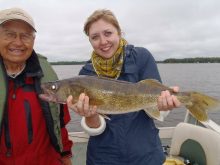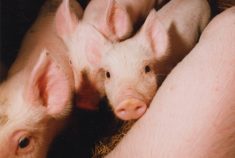The pursuit of basic science in agriculture and agri-food has been squeezed out of federal priorities in recent years, speakers told an Agriculture Institute of Canada conference.
“Funding remains a challenge for us,” Robert Gordon, dean of the Ontario Agriculture College (OAC), told the delegates to the AIC conference, which was crafting a research policy for the 21st century.
Despite agri-food’s status as one of the leading manufacturing sectors, employing one in eight Canadians, “research funding available to us is lower than for other sectors,” he said.
Read Also

CUSMA access key among other trade noise: Seeds Canada panel
Seeds Canada conference panelists say Canada needs to stay focused and wait as U.S. trade and tariff chaos develops, and a Canada-U.S.-Mexico Agreement review looms
“Universities face a changing landscape trying to ensure we have the capacity to conduct research,” he noted. “A single institution can’t do it all and we have to partner with other institutions.”
Wilf Keller, president and CEO of Ag-West Bio Inc., said Canada has become very weak in basic research. “There is not enough funding to support a university faculty. We’re seeing a terrible waste of young brain power.”
Global research projects have become increasingly important, but Canadians cannot receive funding to participate in them, he said.
While many farm groups have research checkoffs, no way exists to integrate the funds into common projects, he added. For example the partnership of Canterra, Agriculture Canada and the Alberta Wheat Commission leaves out the enhanced research impact of including wheat farmers in Saskatchewan, Manitoba and Ontario in the project, he noted. “We could do a lot of basic research to make sure our wheat industry will be competitive 30 years from now.”
Universities have taken on a greater role as the federal government has closed labs and cut or not replaced scientists who did much of the fundamental research, Keller said.
More balance
Clarke Topp, a soil physicist, said that unless basic and commercialization research is balanced, “we will have a disaster.” The current drought on the Prairies would be as bad as the dust bowl of the 1930s if researchers hadn’t determined no-till farming preserved the soil.
Canada needs to put more effort into understanding how climate change will impact the agri-food sector, he said. “We don’t have a lot of time to waste. We need to be better equipped with the disaster coming down the road.”
While the country needs more basic research to deal with climate change and other environmental problems, it also “needs to break down the barriers between applied and basic research,” he added. “The two groups need to work together to stimulate ideas.”
Although universities are involved in policy development and basic research, there is less support for professors to hire technical support.
Dependent
That makes them increasingly dependent on graduate or post-doctoral students who aren’t able to provide the required long-term research support because of their own academic priorities, he noted. Also the profs are supervising five graduate students when in the past they would have had two or three.
“It’s hard for them to work on a project with a long-term framework,” he said.
The OAC currently conducts about $58 million worth of research annually, about half of all the research at the University of Guelph, Gordon said. About 30 per cent of the funding comes from the federal government and 20 per cent from farmers and the food industry. There is a growing emphasis on intellectual property in research and the OAC produces about 92 per cent of the patents earned by the University of Guelph.
Keller noted that in 2007, the government created the Science and Technology Innovation Council as an advisory board for government research funding. It identified four key areas, which didn’t include agri-food. A year later the sector moved to the No. 1 rank among manufacturers and was lumped under the natural resources.
“Agriculture Canada should have a much stronger mandate for basic research,” he said. Its research staff has dwindled from 1,000 in the 1970s to less than 400 today. Many of them are close to retirement and there is no plan to replace them.
“There has also been a serious depredation of research capacity at the National Research Council,” he added. “Where are the long-term ideas going to come from? We need a national system that rejuvenates the federal labs. We cannot depend on the universities to conduct all the research.”
He also urged farm organizations to create a forum in which farmers, the food industry and scientists can discuss research priorities.



















